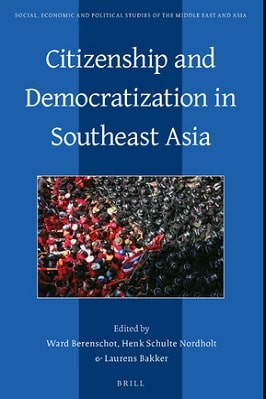
| Book Title | Citizenship And Democratization In Southeast Asia |
| Book Author | Ward Berenschot |
| Total Pages | 332 |
| Book Views | |
| Language | English |
| Book Download | PDF Direct Download Link |
| Get Hardcover | Click for Hard Similar Copy from Amazon |
Citizenship and Democratization in Southeast Asia Edited by Ward Berenschot – Henk – Schulte Nordholt – Laurens Bakker
CITIZENSHIP AND DEMOCRATIZATION IN SOUTHEAST ASIA EDITED
Introduction: Citizenship and Democratization in Postcolonial Southeast Asia Ward Berenschot, Henk Schulte Nordholt and Laurens Bakker
Paradox. Bemused observers seem to prefer this word to describe the nature of democratization processes across Southeast Asia. From the Philippines (Dressel 2011) to Thailand (Kuhonta 2008) and Indonesia (Hadiz and Robison 2005) commentators are using the word ‘paradox’ to describe a remarkable similar puzzle.
The widening of political and civil rights after the fall of authoritarian regimes in Thailand (1992), Philippines (1986) and Indonesia (1998) (and to some extent Malaysia after the resignation of Prime Minister Mahathir Mohamed in 2003) has on the one hand led to a much livelier public sphere, a freer and more active public debate and an intensified political participation.
New protest movements – such as the anti-corruption movements in Indonesia and Malaysia or the Red versus Yellow protests in Thailand – have succeeded in organizing big protests and challenging ruling elites. Moreover, electoral democracy can be termed a success.
Yet, on the other hand, the successful institution of free and fair elections seems to have done little to curtail the dominance of oligarchic elites and patronage politics.
Throughout Southeast Asia, observers are discerning the development of ‘patronage democracies’ (Walker 2012; Crouch 2010; Van Klinken 2009; Schulte Nordholt and Van Klinken 2007; Simandjuntak 2010) as ‘predatory elites’ (Hadiz 2010) are succeeding in winning elections by using either their ‘money power’ to buy voters or if that fails, the ‘muscle power’ of allied criminal elements to coerce them (Aspinall and Van Klinken 2010).
In these contests, the efforts to woo voters by presenting some sort of policy platform is kept to a minimum, as election speeches are filled with appeals to ethnic identities (Schulte Nordholt 2008, 2011) and promises of preferential access to state resources. Often weakly organized, the activities of political parties are mostly geared towards facilitating clientelistic exchanges between politicians and voters, rather than facilitating public debate or developing programmatic policy agendas (Tomsa and Ufen 2012). Popular representation often seems flawed and ‘substantial democratization’ remains elusive ( Törnquist 2005; Törnquist et al. 2009).
Particularly striking is the relatively little impact that democratic reforms and widening press freedom seem to have on the practice of business elites to strike up deals with political elites in order to gain access to lucrative resources – such as government contracts, exclusive concessions to extract natural resources, exclusive import rights, et cetera.
This collusion between businesses, bureaucrats and politicians not only severely weakens legal institutions (Aspinall and Van Klinken 2010) but also leads to a loss of income for Southeast Asian states, higher prices for consumers and increasing income inequalities. Yet citizens are failing to use their newly won democratic freedoms to end such practices.
As Jeffrey Winters (2011:156) writes with puzzlement about Indonesia, ‘It would not be easy to find another country where so much fabulous wealth could be held by oligarchs who are surrounded by so many millions of people living in so much poverty and frustration, and yet oligarchs face no imminent threats from below and somehow operate economically without the protections of property rights based on the rule of law’.
How can this paradox be explained? Why have democratic reforms in Southeast Asia so rarely enabled citizens to resist or end the predatory and clientelistic practices of their political elites?
The persistence of these practices and the ‘stalling’ (Mietzner 2011) of Southeast Asian democratization processes cannot be attributed solely to institutional shortcomings or selfish behaviour of elites.
Instead, there is an urgent need to study these practices ‘from below’ by studying the ways in which citizenship is being perceived and practised by ordinary Southeast Asians.
This book, therefore, aims to highlight the importance of studying changing forms of citizenship in Southeast Asia in order to understand the particularities of democratization processes in the region.
Citizenship has rarely been a topic in both public and academic debates in Southeast Asia. On the one hand contributions to public debate rarely – or, in our eyes: not often enough – conceptualize the challenges facing Southeast Asian democracies in terms of citizenship.
While debates rage on about the nature of democracy, ideal political leadership or the need to raise political moral standards, there is relatively little discussion about what democratic citizenship in present-day Southeast Asia is or should entail.1
Conversely, the field of citizenship studies has also paid surprisingly little attention to the forms that
To read more about the Citizenship And Democratization In Southeast Asia book Click the download button below to get it for free
Report broken link
Support this Website
Click here to join our Telegram group for new Books